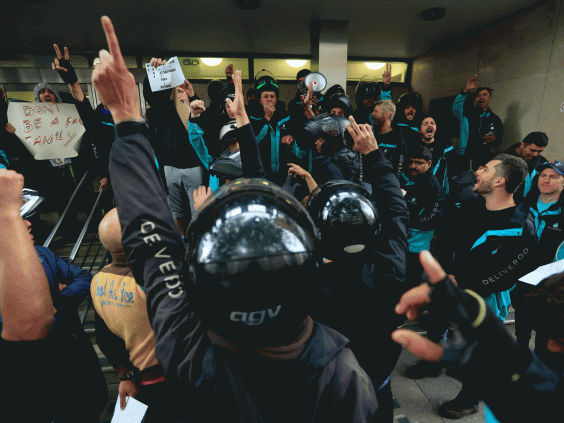
- Products
- Solutions
- Learn
- Partner
- Try Now

As the year ends, a period of reflection begins. This reflection is usually accompanied by anticipation, and resolutions for the future.
NextJuggernaut wishes to impart something of note to all our readers – I sincerely hope you’ve found all our work insightful thus far. In that vein, this is a reflective/predictive post on the on-demand economy. We will underline certain trends that were observed through all of last year, and a few takeaways that allow us to make predictions for the future.
While periods of recession, particularly in the western hemisphere were a tipping point for the growth of the sharing economy, it has now become more of an alternative choice for many. The millennial generation particularly happens to be the sharing economy stakeholder – both, as entrepreneurs, businessmen and consumers themselves.
It is also a movement that is not purely economic in its spread – it’s a lifestyle choice which is slowly changing the way the economy functions. For example, while many professionals took to freelancing after 2008 and an unhealthy economic period, the advent of platforms to support such personnel gave way to an important idea: freelancing could be a way of life, especially for those who preferred a flexible professional environment.

Technology and its growth have obviously spurred the movement on. In fact, technology is THE integral aspect for all on-demand mechanisms and their streamlining. The edge the sharing economy has due to its disruptive potential is because their business models can be sustained by technological growth and innovation. If Uber did not possess such a stellar platform, it would not enjoy the position it has today – the same goes for all logistical and ecommerce based businesses.
Sector-based Disruption
![]()
The sharing economy is quite intrusive. By playing on mechanisms and augmenting their businesses with analytics and powerful platform-based wizardry, they experience exponential growth. They also tend to operate in sectors that have decidedly not faced any innovation and where growth has been generally stagnant.
Airbnb’s $10 billion valuation has surpassed Hyatt, an industry giant operating within the conventional paradigm. Uber itself, with its attributed $18 billion has far surpassed other names that have all but faded: Hertz and Avis.
Some sectors, such as the on-demand laundry sector, have simply exploded, creating a surplus of such businesses going neck to neck against each other in fierce and fast competition. This economy creates standards of its own – growth is no longer measured in decades but in years, and in some cases even months (Slack, for example).
The sharing economy also operates on a different style of consumption. Here, commodities are exchanged, leased, traded for and shared as opposed to outright purchase. Time is the main currency here, with the on-demand’s fascination for all things ‘instant’ and ‘at your doorstep’.
If many startups earlier arose out of a need, or necessity to address grievous problems within sectors – that is no longer the case. Every quarter, fundraising rounds simply amplify their previous investments and the fast promise of growth even attracts pleasure and luxury-based ventures with the same premise.

The sectors that faced maximum disruption was the food delivery industry, the transportation industry, logistics, Home Services, followed by smaller sectors such as beauty and – because of the internet of things (IoT) model of development – healthcare.
Disrupting Workplaces
The sharing economy has changed the nature of work itself, with its advent. Earlier, points of control followed the singular model, where one huge command center would control many international arms, with relative autonomy for the branches. Many new businesses however follow the glocal model, which is a global model with local extensions – seamless sharing of all information enabled by technology. This is not limited to sharing, but working itself, with growth driven by highly calculated, autonomous calculations in the form of Business Intelligence.

As a result, data banks, big data, social media roundups, data mining, business analytics, and cloud computing – all have seen an immense increase in terms of services rendered – be it for startups or enterprises.
Transactions are also shafting toward the digital – the rise of ecommerce based companies signals that – along with companies that make these transactions secure. The value of digital currency is immense, along with the purchasing power one has in terms of international access – space is immensely compressed due to hyper connectivity.
The direct impact also falls on the types of workplaces coming up. Startups and small businesses, while transient in their capacities, are rising in number. The need for independence and flexibility is visible even here, as they try matching their inferior manpower with superior technology and new models of working and experimentation.
2016 saw something of a decline in these numbers as concerns the young population – however, the older generation with its capital reserves are delving into at least beginning their own businesses. The Kaufmann Index suggests that 500,000 businesses were started each month by adults in the U.S. – a staggering number by any standard. More than a third of the U.S. workforce is employed by these small businesses and startups – also another Kaufmann statistic.
Small businesses also depend a lot on social media etc. due to their revenue standards, for marketing and other such. Thus, the freelancing marketing industry also grew tremendously on the back of this economy, with services such as content to website design to market campaigns being entirely outsourced for a temporary period.
Pre-emptive Strikes in the Sharing Conundrum

Legislation hit the sharing economy in a mixed manner this year and the last – with Airbnb facing a charge that said more than 72% of its rented sites were violating some law or another – and Uber itself has had to mobilize their dedicate user base in order to strong arm officials across the United States. The journey has been quite successful, however, as many states, while agreeing to regulate Uber’s activities, have given it quite a free reign in their landscape – this started with Illinois in January 2015. Now, 22 states have already passed ride-sharing legislation – even the law seems to move fast into action.
Similar efforts are being made by Uber worldwide – and do in fact, indicate some sort of precedent. The fact that the sharing economy is here to stay, and whether a compromise will be reached between legislative borders is anybody’s guess. Some governments are lenient while others stubborn. Singapore has emerged to be quite a player for the sharing economy, what with its dedicated coalition – and even Europe swings into action with the U.K. and certain E.U. countries making collaborative efforts to usher in the new.
This year will see a continuum of such legislative activities through the world as the new methods of doing business become more pronounced.
Shots in the Dark
We call these certain predictions shots in the dark, given that the sharing economy’s still in its volatile state. Businesses topple overnight, or ascend to become unicorns with the same speed – the unpredictability of innovation can only be contained by the entrepreneur’s willingness to experiment – and the entrepreneur is ready to do just that.
Such predictions may also qualify to be educated guesses.

- Witnessing the rise of local players
While companies like Uber (few as they are) with their gigantic valuations can control larger areas by immensely diversifying, the tactics needed to keep them smoothly flowing are quite strenuous. The focus cannot be narrowed towards expansion – it is only fitting that revenue should not take the back seat, given all the failures (big names like Washio and Homejoy toppling).
A hyperlocal focus and stronghold is more beneficial, to sustain growth and redirect finances into improving services and cementing the brand-name. A brand that has benefitted by this is Grab, restricting its services to the Asian region for a long time – as compared to Uber’s significant defeat at the hands of Didi Kuaidi in China.
Collaborations are also important, rather than diversification in case your resources stretch too thin – signified by Lyft and Ola planning to combine forces.
Deliveroo is another great example for someone who’s not stretched themselves too thin, although their legislative issues still plague them.

- Taking Care of your Employees
This has been one of THE key problems as to the dissolution of on-demand companies that initially make a killing. Not having a strong employee-benefit program will not generate loyalty, despite their freelance nature. Working them overtime and not letting them see adequate revenue for short term gain will would severely in the form of attrition and lawsuits. Check Grab’s program, if you don’t believe it – and you’ll see why it’s better to make your company a pleasure to work for.
Thus, legislative affairs being on the rise only signal more clashes until legislative changes followed by changes in the ways in which businesses operate take place.
- Food Delivery is pretty Adventurous
If you’re venturing into this sector, you need to be pretty adventurous. With Instacart barely holding the fort as a food-cum-grocery delivery venture at $2 billion, more and more players flood the market. Amazon’s Hot Wheels service and UberEats have already forayed, and these companies have a significant treasury. It will become tougher to consolidate your share the coming year.
- Corporate and Start-up cultures will merge

We were leading to this point with all the rhetoric above – indicating that integrated work environments will become more common. Outsourcing professionals will become more commonplace, as the reduction of costs is glaringly obvious. Many organizations will make highly analytical, calculated decisions and over that, integrate much more technological apparatus in their daily workings.
- Step into the Machine Age

Many companies have already integrated a fair bit of autonomous support into their systems. Chatbots, intelligent platforms, self-driving cars, automated cashiers and tellers – all these are already being used on some scale. The advent of AI with ventures like Deepmind promises to create yet another level of business and administrative tech-based intelligence; it is only a matter of time.
- Social Responsibility

This year, we also saw our fair share of startups that were centered around solving social and administrative problems instead of being purely profit-motivated. We covered some of these, like Braincheck and Zipline (blessings in the form of aid in the healthcare industry) – and yet others like Peerby (sharing commodities) and SnappCar (car sharing – Neatherlands) point out towards sustainable methods of operation in the same market.
We foresee this trend to increase, and also support co-habitation in terms of business growth instead of simple cutthroat competition.
- Further Development of Niche Sectors

The advent of Niche has really hit with this year and as a sharing economy trend in general. From getting your dog walked to simply specializing in data mining – specialization is your friend. An Uber for Drivers? Sounds good. A startup that sends planned diets with calorific specifications – already done. There’s a lot that has been looked at, and a lot more to be found.
Luxury and other such versions of the same brand will also thrive as more agents prepare to spend in the e-commerce sector, and the smartphone becomes a necessity.
Conclusion
Well, that’s what we have here. Hopefully, we highlighted our observations for the sharing economy as we saw it in 2016 – taking you through the sharing economy onslaught this year, pressing upon the changing nature of work, putting you through some brand-specific predictions while also examining legislative issues in the mix.
Subscribe to stay ahead with the latest updates and entrepreneurial insights!

Subscribe to our newsletter
Get access to the latest industry & product insights.





















